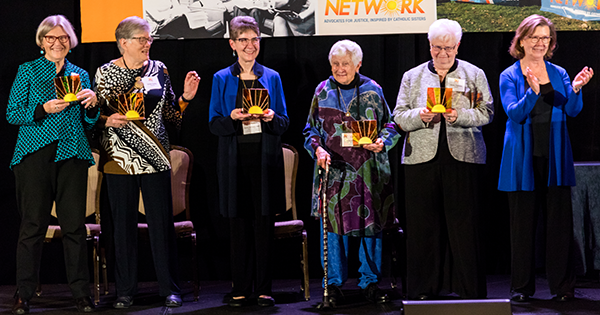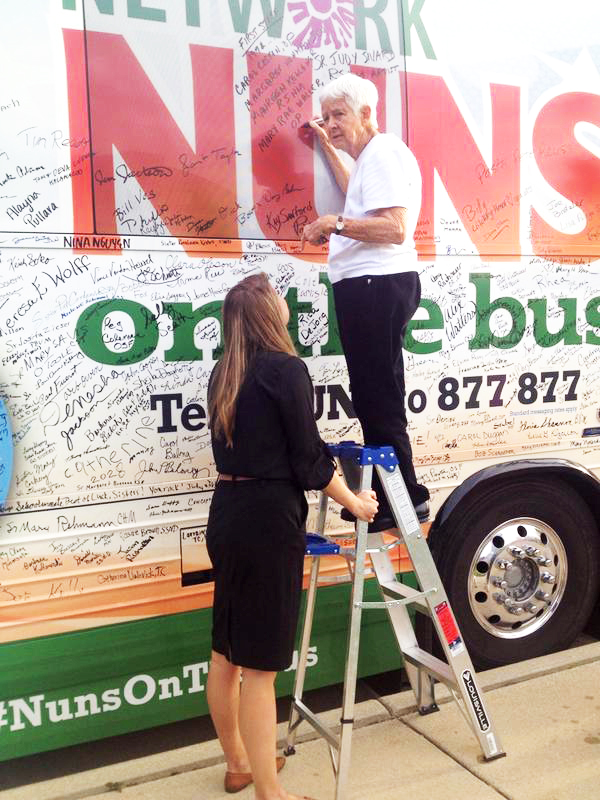Sister Carol Coston, OP, Founding Director, Attends 50th Anniversary Gala of NETWORK

Photo by Shedrick Pent, Courtesy of NETWORK
“Justice Ablaze” was the theme as Catholic Sisters and other social justice advocates gathered at the Hyatt Regency in Washington, D.C., on April 22 to celebrate the “50-year justice journey” of NETWORK: a Catholic social justice lobby. Among the celebrants were Sister Carol Coston, OP, Founding Executive Director of NETWORK; Sister Patricia Siemen, OP, Prioress of the Adrian Dominican Congregation and a member of the 50th Anniversary Host Committee; and Sister Elise García, OP, General Councilor.
During the Gala, Sister Carol and four other Executive Directors of NETWORK were the inaugural recipients of the Sister Catherine Pinkerton Legacy Award, which recognizes “social justice advocates who have spent their lives working to change structures that cause poverty and inequality.” The other four directors were Sisters Nancy Sylvester, IHM; Kathy Thornton, RSM; Adrian Dominican Sister Maureen Fenlon, OP; Simone Campbell, SSS. Also receiving the award was the Friends Committee on National Legislation.
The National Black Sisters’ Conference (NBSC) received the inaugural Distinguished Justice-Seeker Award.
“It’s hard for me to envision that [NETWORK] lasted for 50 years,” given the many challenges, Sister Carol said in an interview before the celebration. “I think part of the anniversary celebration is to honor the congregations that were involved from the very beginning,” including the Adrian Dominican Sisters.
Sister Carol was present in Washington, D.C., in December 1971 when a group of 47 Catholic Sisters from a variety of religious congregations met and decided to begin a network of Sisters to lobby for social justice. Among them were Adrian Dominican Sisters Marcella Hess, OP, Kathleen Gannon, OP, and Carol Jean McDonnell, OP. A steering committee met about a month later, and Sister Carol was chosen as the Founding Director. NETWORK officially began in April 1972.

Adrian Dominican Sisters File Photo
Sister Carol recalled the humble beginnings of NETWORK. “After we had decided to go ahead and start NETWORK, two of the Sisters of the Sacred Heart of Jesus offered us space in their house.” The first staff members received free room and board at a house near the Capitol. The office was on the second floor of a building owned by the Veterans of Foreign War.
One of the first challenges for NETWORK, Sister Carol said, was deciding which issues to focus on. “There were too many issues,” she said. The NETWORK leaders chose to lobby for legislative actions such as cutting off funds for the Vietnam War, reducing aid to countries that violated human rights, reducing the defense budget and increasing funds for social services, and raising the federal minimum wage.
NETWORK then brought Sisters together to lobby Congress for these actions. “We had the first legislative seminar in 1972,” Sister Carol recalled. “We did a crash course on what the process was and tried to get the women to know who their member of Congress was and, if possible, meet them.” She recalled putting the Sisters on buses to Capitol Hill to hold meetings with their Congressional representatives, lobbying for bills that enhanced social justice.
Sister Carol noted that legislative advocacy for justice was not a traditional ministry for Sisters. “Many times, the Sisters who came to the seminar might have been the only member of their congregation who was involved in political ministry,” she said. “It was encouraging to them to be with other Sisters” and to broaden their experience.
Sister Carol herself learned about the legislative process through her earlier ministry as a teacher whose students participated in speech and debate competitions. “This gave me a little bit of background on how Congress works,” she said. “I had the idea of how a bill becomes a law.”
In the years since, NETWORK has continued its work with Sisters to advocate for social justice. One of the most visible programs in recent years has been Nuns on the Bus, organized by Sister Simone Campbell, SSS, when she directed NETWORK. Nuns on the Bus operates during election years. Staff members of NETWORK and other Sisters travel to designated areas of the country to host town hall meetings, rallies, and presentations on designated areas of focus, such as voter engagement, politics for the common good, and tax justice.
Sister Carol said she learned much during her 10 years as Director of NETWORK. “You can do better together than by yourself,” she said. “What happened when we all came together for legislative seminars was that enthusiasm came from working together,” she said.
Her years of hard work to lobby for social justice did not go unnoticed. In January 2001, President Bill Clinton presented Sister Carol with the Presidential Citizens Medal, the second highest honor for civilians, for her work in helping to create NETWORK. She was the first Catholic Sister to receive this honor.
Read more about Sister Carol and her work in building up NETWORK in this Global Sisters Report article by Dan Stockman.
 USA
USA


